‘An extraordinary legacy’: Tributes after chimpanzee expert Jane Goodall dies age 91
Dr Jane Goodall, who died today at 91, devoted her life to the study and conservation of chimpanzees and the other great apes.
Through her pioneering new ways to study them, Goodall discovered that chimps used tools, created complex societies and could be so aggressive they could even kill one another.
This suggested that chimps and humans are likely to have common ancestors – and was ground-breaking information.
Goodall’s work made waves amongst her fellow researchers, and the public enthusiastically responded to her revelations.
The idea that chimps and humans were related spurred debates about what it means to be human, inspiring a rethink on animal rights. Her books were so widely read that when one of Jane’s subjects Flo died in 1972, The Sunday Times ran an obituary.
Goodall remained active until the days before her death, engaged on a speaking tour of the US, and travelled the world widely to discuss her life and campaign to better understand the natural world.
She was recognised earlier this year with a Medal of Freedom by then-President Joe Biden, in addition to her damehood in the UK and other international plaudits.
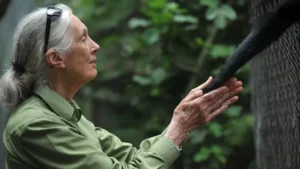
Today tributes highlighted her remarkable impact on our understanding of wildlife and her hero status among fellow naturalists.
Sir David Attenborough and Prince William have paid tribute to Dame Jane Goodall, a world-leading expert on chimpanzees, who has died aged 91.
Sir David, 99, a friend of Dr Goodall’s, praised her as a “tireless advocate” of chimpanzees and “a great champion of environmental protection”.
The Prince of Wales said she inspired him personally and “her boundless curiosity, compassion and pioneering spirit transformed our understanding of the natural world”.
Dr Goodall died of natural causes while in California on a speaking tour of the US, according to a statement from the Jane Goodall Institute.
It said her discoveries “revolutionised science” and that she advocated “for the protection and restoration of our natural world”.
In a statement issued to the PA news agency, BBC presenter and renowned environmentalist Sir David said: “Jane Goodall was the first to prove that an investigating scientist and a great ape living in the wild could become true friends and in doing so she came to transform our understanding of chimpanzees.”
Prince William said “the world has lost an extraordinary voice” in a post on X, adding: “she challenged us all to make a difference and inspired me and countless others to work to protect our planet. Jane Goodall made a difference.”
Many other public figures as well as global organisations have praised Dr Goodall’s legacy.
Former US president Barack Obama said Dr Goodall “opened doors for generations of women in science”, while actor and environmental campaigner Leonardo DiCaprio said she “inspired millions to care, to act, and to hope”, and called her “a true hero for the planet”.
The United Nations said it mourned the loss of Dr Goodall, saying that she “worked tirelessly for our planet and all its inhabitants, leaving an extraordinary legacy for humanity and nature”.
Greenpeace said it was “heartbroken” by her death, calling her “one of the true conservation giants of our time”.
Its co-executive director in the UK, Will McCallum, said: “Dr Goodall’s legacy is not only in science but in the global movement she helped spark to protect nature and give hope for a better world.”
Naturalist Chris Packham told the BBC that he counted her among his heroes, calling her “revolutionary” and “remarkable”.
“To have lost a hero at a time when we need all of them on the frontline fighting for life on earth is a tragedy.”
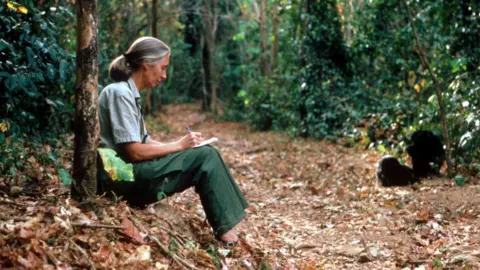
Born in 1934 and raised in London, Dr Goodall said she became fascinated by animals after reading books like The Story of Dr Doolittle and Tarzan.
She met leading primatologist Prof Louis Leakey while staying on a friend’s farm in Kenya in her mid-twenties. Although she had no qualifications, Mr Leakey saw her potential and helped arrange her first research trip to the jungles of Tanzania in 1960.
That year, she became the first person to record witnessing an animal using a tool – a large male chimpanzee, who she had named David Greybeard, digging termites out of a mound with a stick.
Until then, it was thought only humans were intelligent enough to do so. Her observations challenged years of conventional scientific thinking and shaped the future of evolutionary science.
Her work was published in leading journals, and in 1965, she made the front cover of National Geographic, introducing the world to the emotional and social lives of the primates.
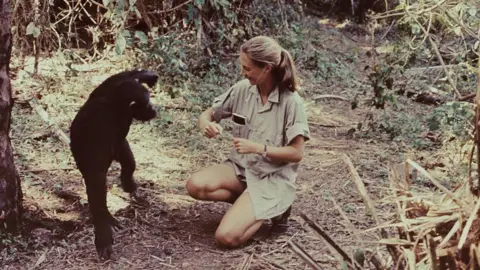 Natux Tours & travel
Natux Tours & travel
She revealed that the animals form strong family bonds and even engage in warfare over territory. She featured in a television documentary narrated by Orson Welles, which saw her playing and wrestling with baby chimps.
Her approach – associating so closely with the animals she studied, naming them and even referring to them as “my friends” – was scoffed at by some, mostly male, scientists at the time. She undertook a PhD based on her findings, despite not having an undergraduate degree or any prior scientific training.
After her experiences in the field she became an activist, working to free chimpanzees kept in zoos or in captivity for medical research, and later urged action on climate change in the face of widespread habitat devastation.
She told the BBC in 2024: “We’re in the midst of the sixth great extinction… the more we can do to restore nature and protect existing forests, the better.”
Asked what kept her motivated late in life, she said: “Surely people want a future for their children.”
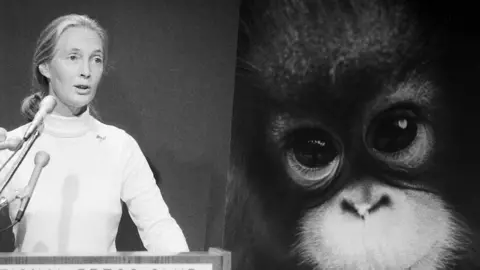 Natux Tours & travel
Natux Tours & travel
Her Jane Goodall Institute, founded in 1977, works to protect chimpanzees and supports projects aimed at benefiting animals and the environment.
Dr Goodall was appointed a Dame in 2003 and received the US Presidential Medal of Freedom in 2025.
She was known for travelling constantly for her work, telling The Times newspaper in 2022 that she had not slept in the same bed for more than three weeks since 1986.
Dr Goodall worked right up until her death, being interviewed on stage in New York a week ago. She was due to speak again at a sold-out event on 3 October in California.
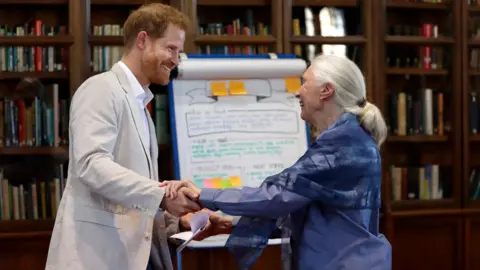 Natux Tours & Travel
Natux Tours & Travel

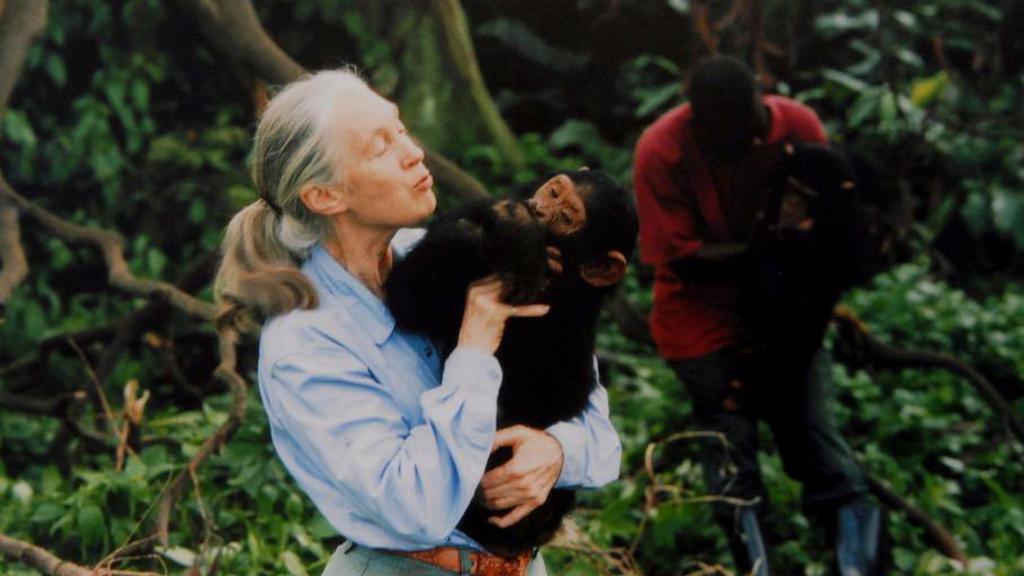







Leave a Reply